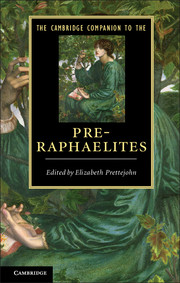Book contents
- Frontmatter
- Introduction
- PART ONE PRE-RAPHAELITISM
- PART TWO PRE-RAPHAELITES
- 6 The poetry of Dante Gabriel Rossetti (1828–1882)
- 7 The painting of Dante Gabriel Rossetti
- 8 William Holman Hunt (1827–1910)
- 9 John Everett Millais (1829–1896)
- 10 Ford Madox Brown (1821–1893)
- 11 Christina Rossetti (1830–1894)
- 12 Elizabeth Eleanor Siddall (1829–1862)
- 13 The writings of William Morris (1834–1896)
- 14 The designs of William Morris
- 15 Edward Burne-Jones (1833–1898)
- 16 Algernon Charles Swinburne (1837–1909)
- 17 William Michael Rossetti (1829–1919)
- 18 Envoi
- Appendix 1 The contents of The Germ
- Appendix 2 The Pre-Raphaelite ‘list of Immortals’
- Guide to further reading and looking
- Cambridge Companions to …
- Index
10 - Ford Madox Brown (1821–1893)
from PART TWO - PRE-RAPHAELITES
Published online by Cambridge University Press: 28 September 2012
- Frontmatter
- Introduction
- PART ONE PRE-RAPHAELITISM
- PART TWO PRE-RAPHAELITES
- 6 The poetry of Dante Gabriel Rossetti (1828–1882)
- 7 The painting of Dante Gabriel Rossetti
- 8 William Holman Hunt (1827–1910)
- 9 John Everett Millais (1829–1896)
- 10 Ford Madox Brown (1821–1893)
- 11 Christina Rossetti (1830–1894)
- 12 Elizabeth Eleanor Siddall (1829–1862)
- 13 The writings of William Morris (1834–1896)
- 14 The designs of William Morris
- 15 Edward Burne-Jones (1833–1898)
- 16 Algernon Charles Swinburne (1837–1909)
- 17 William Michael Rossetti (1829–1919)
- 18 Envoi
- Appendix 1 The contents of The Germ
- Appendix 2 The Pre-Raphaelite ‘list of Immortals’
- Guide to further reading and looking
- Cambridge Companions to …
- Index
Summary
A resoundingly paradoxical figure, Ford Madox Brown was never a member of the Pre-Raphaelite Brotherhood, yet his works stand at the heart of the Pre-Raphaelite corpus. He contributed to The Germ, taught Rossetti, and his work of the late 1840s seems to prefigure many of the most radical achievements of the PRB. Despite his avowed focus on history painting, it was left to Brown to perfect Pre-Raphaelite modern-life painting and to create in Work (1852–65, City of Manchester Art Galleries) and The Last of England (1852–5, Birmingham Museums & Art Gallery) its greatest monuments. Brown's landscapes, moreover, are among the finest painted explorations of ‘truth to nature’. In 1865 he published a lengthy descriptive catalogue to a retrospective exhibition of his major works which stands as a key text for the history of the Pre-Raphaelite movement. In the 1860s Brown became a leading figure in the Aesthetic Movement and a pioneering designer in the ‘Firm’ of Morris, Marshall, Faulkner & Co., and in later years he espoused an idiosyncratic form of socialism. Brown embodied, in other words, all the major currents of Pre-Raphaelitism.
And yet he was nonetheless perpetually the outsider during his lifetime, outside even of the ‘avant-garde’ grouping of the Pre-Raphaelite Brotherhood itself. He systematically alienated himself from the main streams of patronage and critical approbation, consistently placing himself in antagonistic relations with the establishment. Undoubtedly this was in part the result of the artist's personality – querulous; hasty in his judgements; easily wounded. But in Brown’s seemingly self-defeating professional conduct we can see the same refusal to compromise, or to accommodate the status quo, which is the essence of his art. Brown’s work is notable for its frequent recourse to the grotesque; its frequent obscurity of subject and meaning; and its refusal to conform to the requirements of any tendency – including those of Pre- Raphaelitism.
- Type
- Chapter
- Information
- The Cambridge Companion to the Pre-Raphaelites , pp. 148 - 163Publisher: Cambridge University PressPrint publication year: 2012
- 1
- Cited by



